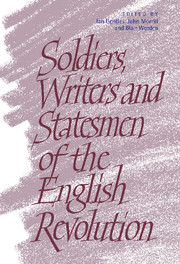Book contents
- Frontmatter
- Contents
- Preface
- Austin Woolrych: an appreciation
- 1 Secret alliance and Protestant agitation in two kingdoms: the early Caroline background to the Irish Rebellion of 1641
- 2 Of armies and architecture: the employments of Robert Scawen
- 3 George Digby, Royalist intrigue and the collapse of the cause
- 4 The iconography of revolution: England 1642–1649
- 5 The casualties of war: treatment of the dead and wounded in the English Civil War
- 6 ‘A bastard kind of militia’, localism, and tactics in the second civil war
- 7 Cromwell's commissioners for preserving the peace of the Commonwealth: a Staffordshire case study
- 8 Colonel Gervase Benson, Captain John Archer, and the corporation of Kendal, c. 1644—c. 1655
- 9 Repacifying the polity: the responses of Hobbes and Harrington to the ‘crisis of the common law’
- 10 Equality in an unequal commonwealth: James Harrington's republicanism and the meaning of equality
- 11 John Milton and Oliver Cromwell
- 12 From pillar to post: Milton and the attack on republican humanism at the Restoration
- 13 ‘They that pursew perfaction on earth …’: the political progress of Robert Overton
- 14 Locke no Leveller
- A bibliography of the writings of Austin Woolrych, 1955-95
- Index
9 - Repacifying the polity: the responses of Hobbes and Harrington to the ‘crisis of the common law’
Published online by Cambridge University Press: 10 November 2009
- Frontmatter
- Contents
- Preface
- Austin Woolrych: an appreciation
- 1 Secret alliance and Protestant agitation in two kingdoms: the early Caroline background to the Irish Rebellion of 1641
- 2 Of armies and architecture: the employments of Robert Scawen
- 3 George Digby, Royalist intrigue and the collapse of the cause
- 4 The iconography of revolution: England 1642–1649
- 5 The casualties of war: treatment of the dead and wounded in the English Civil War
- 6 ‘A bastard kind of militia’, localism, and tactics in the second civil war
- 7 Cromwell's commissioners for preserving the peace of the Commonwealth: a Staffordshire case study
- 8 Colonel Gervase Benson, Captain John Archer, and the corporation of Kendal, c. 1644—c. 1655
- 9 Repacifying the polity: the responses of Hobbes and Harrington to the ‘crisis of the common law’
- 10 Equality in an unequal commonwealth: James Harrington's republicanism and the meaning of equality
- 11 John Milton and Oliver Cromwell
- 12 From pillar to post: Milton and the attack on republican humanism at the Restoration
- 13 ‘They that pursew perfaction on earth …’: the political progress of Robert Overton
- 14 Locke no Leveller
- A bibliography of the writings of Austin Woolrych, 1955-95
- Index
Summary
the ‘crisis of the common law' and consequent problems
Political thinkers, especially the most creative of them, tend to develop their ideas within a great variety of intellectual contexts. Few of them can satisfactorily be studied in relation to only one or two of those contexts. It is often true, as well, that the ways in which thinkers respond to their contexts can interact with one another to produce unexpected results. The following essay is an examination of some of the less-explored dimensions of the political writings produced after 1650 by Thomas Hobbes and James Harrington; and it suggests that it is possible to consider them as having responded to a ‘crisis of the common law' that engulfed English political life in the years 1640 to 1642, and beyond. I do not suppose that this context can lead us to an exhaustive analysis of either of these thinkers; and I therefore wish to deny neither that there are other, better-known and perhaps contradictory, aspects of their thinking that can only be explained in other contexts, nor that these other aspects may predominate over the dimensions explored below.
Before 1640 many in English public life believed that they lived in a ‘pacified polity’, a view underpinned by the assumptions and attitudes that made up what we know as the idea of the ‘ancient constitution’. Hobbes and Harrington were often severe critics of the ‘ancient constitution'; but they shared its ideal of the ‘pacified polity’.
- Type
- Chapter
- Information
- Soldiers, Writers and Statesmen of the English Revolution , pp. 202 - 228Publisher: Cambridge University PressPrint publication year: 1998
- 5
- Cited by



